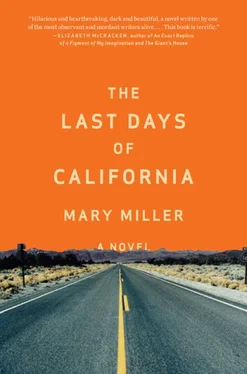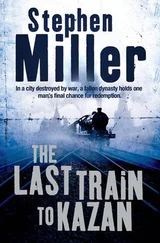Elise tried to call Dan but he didn’t answer.
“He doesn’t want to talk to you,” I said.
“He always answers my calls, even at the movie. He could be in a ditch somewhere.”
“He’s not in a ditch—he either lost his phone or he’s avoiding you.”
“How do you know?” she asked. “You’ve never even had a boyfriend.”
“I have a cell phone.” “I know how cell phones work—people pick up if they want to talk to you, or they see you called and call you back.”
She looked like she was going to cry, so I told her I was sure it was nothing, his phone was broken or he’d lost it. Dan was supposed to love her. He told everyone he loved her. Once he’d even told me. The two of us had been sitting together in the den, waiting for Elise to finish getting ready, and I’d stopped eating a bowl of Cap’n Crunch to listen to him tell me how great she was, how she was “his person.” He had found “his person” in life early and he was one of the lucky ones. He must have been drunk. By the time he finished, my cereal was soggy and I took the bowl into the kitchen and dumped it out.
Our parents were halfway through with their hamburgers when we returned. My father handed me fifteen dollars and we got in line behind a pair of guys in work clothes, their names in cursive on their shirt pockets. They stared at Elise.
“What?” she asked, and one of them mumbled, “Nothing.” The other said, “ Dang .” They inched forward, discussing secret menu items.
“You know what’s funny?” I said.
“What?”
“If those guys were cute, you wouldn’t be like, ‘What?’ You’d be glad they were looking at you.”
“You’re a deep thinker,” she said. “One of the best thinkers of our time.”
“Fuck you.” The counter lady heard me and looked horrified.
I ordered a combo: cheeseburger, fries, and a vanilla Frosty—which was even better than the original—and Elise ordered a side salad and a baked potato with butter, sour cream, and chives.
“Why can’t we ever go to Burger King?” she asked, taking everything off of our tray.
“Because their fries are awful,” I said, unwrapping my burger. “It’s like they were fried and then sat for a while and then fried again.” I looked out at the parking lot, packed with cars and trucks and boats.
“Bow your heads,” our father said, and we stopped eating and looked at the table. Somebody had spilled salt everywhere. My father grasped my hand so tightly I didn’t have to hold his at all. My sister’s hand was cool and dry.
“Dear Heavenly Father,” he said.
“Why do we always have to pray in public?” Elise asked, cutting him off. “People are staring at us.”
“People are always staring at you,” I said. Nobody was looking at us except for a well-dressed older lady sitting by herself. She was smiling, but it was a sad smile, like she’d had a family once, too.
“We’re praying because we’re about to eat,” our father said. “To thank Him for providing this food for us.”
“You always do it so loud.”
My father bowed his head and continued.
We ate in silence until Elise asked if anyone wanted her potato.
“I don’t eat vegetarian food,” our father said, in the nastiest voice he could muster.
“It’s a potato,” Elise said. “You’re eating potatoes right now. You also eat eggs and grits and bread and ice cream and about a million other things that are vegetarian.” She got up and threw her food away. I was worried that the baby wasn’t getting enough nutrients. At home, she mixed chocolate protein powder with vanilla almond milk, took multivitamins.
She went to the bathroom again and I listened to a conversation at a nearby table—a white girl with cornrows telling her friend she didn’t eat chicken. Her friend said it was un-American. “What do you eat?” she asked.
“Hog, cow,” the girl with cornrows said. I’d never heard anyone say “hog” or “cow” to refer to meat before.
I finished my burger and fries, saved my Frosty for later.
In the parking lot, a man approached my father with a story about a dead body he had to pick up in Oklahoma, and the gas money he needed to get there. My father said he didn’t have much and the man told him his older brother had been in an automobile accident and there was no one else to claim him. The body had been in the morgue for three days. Elise walked over to the car. My father repeated that he didn’t have much money and then asked how much he needed and the man went over the mileage there and back and said he guessed about eighty dollars. When my father hesitated, the man told him he had a check for that exact amount but didn’t have time to cash it. He promised to take our address and pay us back, swore he’d have the money by Monday and could put it in the mail.
We left our father with the man, who wasn’t poorly dressed or dirty. He was just a regular man, a little overweight, in worn but clean clothes. I wouldn’t have given him anything, but he wasn’t looking at me like that, with those eyes full of need and an answer for everything.
My mother and I got in the car. She played with the radio while Elise and I watched.
“I can’t believe he’s giving him money,” Elise said.
“It’s okay,” our mother said.
“But we don’t have any money.”
“We have money.”
“We know he lost his job.”
“It’s not your business what your father does,” our mother said. “He wouldn’t give it if we didn’t have it to give.”
“Is that true? He lost his job?” I asked, stirring my Frosty, which tasted better when it was half-melted, like a cold delicious soup.
“And now he’s giving him some more!” Elise said. “Oh my God. Anybody could tell that was a story—he’s been rehearsing it all day.” My mother turned the air conditioner up and adjusted all the vents so they pointed at her. “If he gives that man our address, he’s a bigger idiot than I thought.”
Our father got back in the car, wiping his face with a handkerchief.
“How much did you give him?” Elise asked.
There was a long pause before he said, “Eighty dollars,” like he couldn’t believe it himself.
“Eighty dollars!” Elise said.
“He needed it more than we do.”
“Did you even give him a tract?” I asked.
“He was in a bad fix,” he said.
My father knew he’d been taken but stuck with his story—that he believed the man—the man wasn’t on drugs or alcohol, and was clearly in a bad fix. It made me a little sick to think about his wallet minus eighty dollars. I imagined the man at the liquor store, buying steaks for a cookout. How he’d tell the story of the sucker who gave him eighty bucks and laugh.
“Did you give him our address?” I asked.
“It’s bad practice to lend money, it creates resentment. Money should be given with no expectation of repayment,” he said, trying to turn it into a teaching moment.
“I’m going to be sick,” Elise said. “Pull over.”
Our father pulled onto the big shoulder, cutting off a truck in the right-hand lane. The person in the truck laid on the horn; he honked so long we could hear it fade out. Elise toppled out of the car making retching sounds, but there was only a string of spit.
After several more hours—during which time the radio was silent and everyone slept or pretended to sleep—our father pulled off at an exit. I hadn’t seen a sign advertising gas and he was taking his chances. He’d waited nearly too long. The car told him exactly how many miles it had to go until it was empty and we were down to eight, which was the lowest he’d gotten while traveling, though not in Montgomery. In Montgomery, he’d made it to two.
Читать дальше












